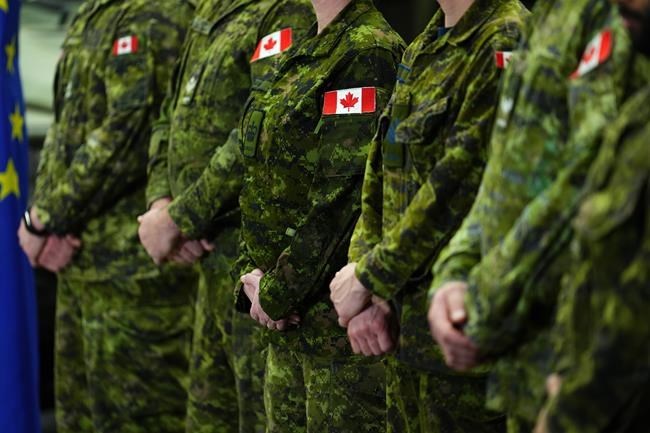OTTAWA — The military is finalizing a policy change to abolish its definition of sexual misconduct and to use a Criminal Code definition for sexual assault instead.
The move is part of an ongoing effort to respond to the 48 recommendations former Supreme Court justice Louise Arbour made in a scathing report on military culture in May 2022.
It's a long and labour-intensive process, says Jocelyne Therrien, the external monitor who tracks the work to implement those changes.
Her newly released second report to the government said there is an "impressive quantity of rules and regulations" and a "broad range of policy instruments" governing the Canadian Armed Forces.
"I am told that they can sometimes contradict one another," Therrien wrote in her Nov. 7 report, which was made public on Monday.
"As a result, even relatively simple policy changes can take many months of work by many individuals."
In her first report last spring, Therrien called for the creation of a multi-year plan to track progress on the military's efforts to enact culture change.
She said the military's Chief Professional Conduct and Culture, Lt.-Gen. Jennie Carignan, developed such a plan in the summer. It has not been made public.
"Of critical importance, the plan states that it will measure and report on outcomes as opposed to the completion of activities," Therrien wrote.
"The next year will show the impact of this plan and potentially move this organization towards its goal of culture change."
Therrien said there is a clear focus at the highest levels of the military to address the problem of sexual misconduct.
Still, it is a long process.
The changes to abolish the use of a military definition of sexual misconduct and use a standardized Criminal Code definition of sexual assault will be "ready for approval" by the end of 2023, Therrien said.
But updating the ministerial directive that uses those definitions "involves more process."
And it will take until late 2024 to update Armed Forces policies so they use the Canada Labour Code definition of harassment, she said.
The Arbour report had also called on the federal government to remove the military's jurisdiction over all sexual offences in the Criminal Code — something Defence Minister Bill Blair said Monday will happen.
But when asked when that change will come, Blair was less certain.
"I will be bringing forward a legislative solution to that in the coming months, and hopefully before the end of this year," he told reporters.
The government accepted an interim recommendation from Arbour in November 2021 to refer such offences to civilian authorities.
Since then, 275 cases were reported to military police. Therrien said 142 of those were transferred to civilian police, which accepted 101 cases and declined 41 others. The declined cases were investigated by either the Armed Forces National Investigation Service or military police.
The report said the 133 cases that were not referred to civilian police fell broadly into several categories: the incidents happened outside Canada, the victims did not want to continue with an investigation or the victims wanted to continue in the military justice system.
Blair said he does not believe it is in keeping with the spirit of Arbour's recommendation to have the military justice system continue to handle the cases.
"Frankly, we want all of these cases to be investigated by the police of jurisdiction and adjudicated in the civilian criminal justice system," he said.
"It's why we're changing the law."
Blair also pledged to announce the names of the seven members of the Military College Review Board in the coming days.
Arbour had examined the culture at two military colleges in Kingston, Ont., and Saint-Jean-sur-Richelieu, Que., finding that there was an "outdated and problematic leadership model."
Blair's predecessor, Anita Anand, said in her response to Therrien's first report in May that the board would be announced in the coming weeks. The Defence Department said in a statement earlier this month that it is finalizing the contracts.
Overall, Blair said by the end of December he expects "we will have implemented almost half" of Arbour's recommendations, and that action has begun on each of them.
This report by The Canadian Press was first published Nov. 20, 2023.
Sarah Ritchie, The Canadian Press



